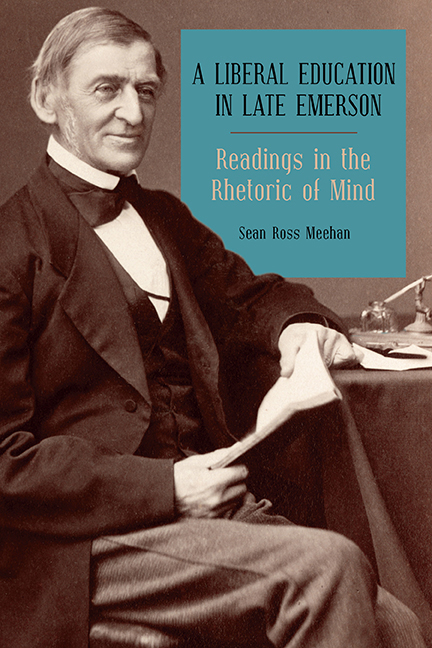Book contents
- Frontmatter
- Dedication
- Epigraph
- Contents
- Acknowledgments
- Introduction: Late Emerson and the Recomposition of Liberal Education
- 1 “Natural Method of Mental Philosophy”: William James's Principles of Pedagogy
- 2 “Education”: Charles W. Eliot's Invention of the University
- 3 “Poetry and Imagination”: Rhetorical Exercises in Walt Whitman's Gymnasium
- 4 “Eloquence”: Lessons in Emerson's Rhetoric of Metonymy
- Conclusion: Du Bois and the Double Consciousness of the College
- Notes
- Bibliography
- Index
Introduction: Late Emerson and the Recomposition of Liberal Education
Published online by Cambridge University Press: 13 April 2019
- Frontmatter
- Dedication
- Epigraph
- Contents
- Acknowledgments
- Introduction: Late Emerson and the Recomposition of Liberal Education
- 1 “Natural Method of Mental Philosophy”: William James's Principles of Pedagogy
- 2 “Education”: Charles W. Eliot's Invention of the University
- 3 “Poetry and Imagination”: Rhetorical Exercises in Walt Whitman's Gymnasium
- 4 “Eloquence”: Lessons in Emerson's Rhetoric of Metonymy
- Conclusion: Du Bois and the Double Consciousness of the College
- Notes
- Bibliography
- Index
Summary
His works are studies. And any youth of free senses and fresh affections shall be spared years of tedious toil,—in which wisdom and fair learning are, for the most part, held at arm's length, planet's width from his grasp,—by graduating from this college.
—Amos Bronson Alcott, Ralph Waldo Emerson (1865)“Nothing Is Old but the Mind”
IN JULY 1867, an aging Ralph Waldo Emerson (1803–82) returned to Harvard College, his alma mater, to deliver the Phi Beta Kappa oration during commencement exercises. This was exactly thirty years after his more famous Phi Beta Kappa address known as “The American Scholar.” As Robert D. Richardson observes in his biography, this later address, which Emerson published in the Atlantic Monthly in 1868 as “Aspects of Culture” and then included in his final volume of essays, Letters and Social Aims (1875), under the title “Progress of Culture,” marks a complex turning point in Emerson's career. The moment was in part triumphant since Emerson was also appointed to Harvard's board of overseers, having been brought back into the fold the previous year—a prodigal son ever since his provocative address at the Divinity School in 1838— with the awarding of an honorary Doctor of Laws. But the moment was also partly tragic, a public marking of what Richardson calls “Emerson's decline,” since as an oratorical performance the “occasion was a notable failure.” Richardson describes the failure in this way: “Emerson suddenly found that he could not see his papers clearly. He had not until that moment needed glasses to read his lectures. He became flustered, his papers slipped away under his hands on the poorly conceived table he was using as a lectern. Finally one of his auditors got up and put a cushion under Emerson's papers for him. The audience was uneasy.” Emerson was getting old, a fact he acknowledged in the opening of “Terminus,” the poem published in the Atlantic Monthly at the beginning of 1867: “It is time to be old.”
To make matters worse, the sixty-four-year-old orator found himself in a country apparently inhospitable to old men. Earlier in the decade, in the 1861 lecture “Old Age,” published in the Atlantic Monthly in 1862, Emerson articulates this circumstance in asserting, “America is the country of young men” (CW 7: 168).
- Type
- Chapter
- Information
- A Liberal Education in Late EmersonReadings in the Rhetoric of Mind, pp. 1 - 20Publisher: Boydell & BrewerPrint publication year: 2019

